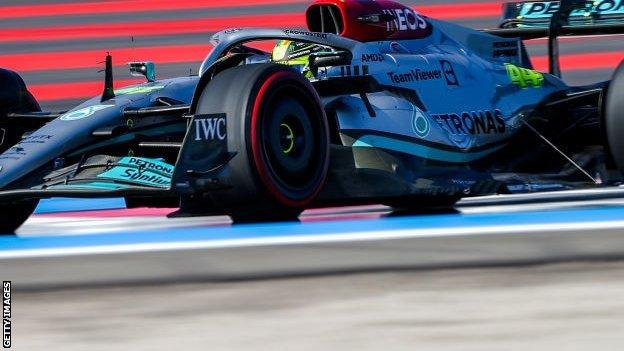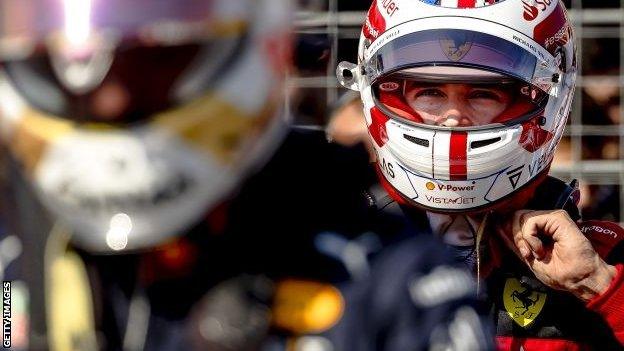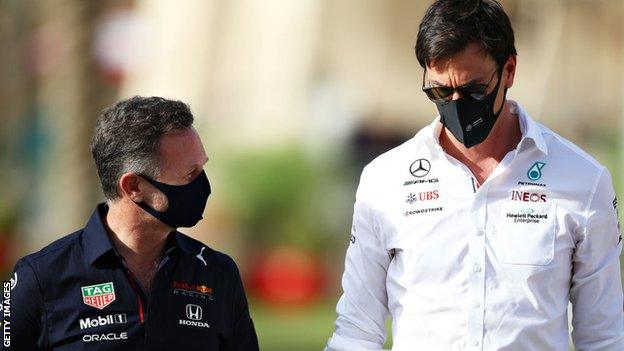French Grand Prix: Lewis Hamilton's surprise at lack of pace and familiar battle in store
- Published
- comments

Lewis Hamilton was nine-tenths of a second off Charles Leclerc's pole-winning lap time
Lewis Hamilton and Mercedes acknowledged they were surprised to be so far off the pace at the French Grand Prix and are at a loss to explain why.
Mercedes had pinpointed the Paul Ricard track as one where their car should be strong, but they were further off the pace than they have been for four races.
Hamilton said: "We were hoping to be a lot closer than we are.
"I was thinking we might be 0.2secs or something like that. But we're a second off and I don't have an answer for that."
Mercedes have taken a car upgrade to France that they thought might help them close the gap to front-runners Red Bull and Ferrari, who also have developments on their cars this weekend. But instead Mercedes lost ground.
Hamilton qualified fourth, 0.893secs off the pole time set by Ferrari's Charles Leclerc. In percentage terms, Mercedes are slower than at any race since the Azerbaijan Grand Prix in early June.
The seven-time champion said his qualifying lap was "beautiful" and he ended up 0.366secs quicker than team-mate George Russell, who was also slower than McLaren's Lando Norris.
But Hamilton added: "For whatever reason, we seem to be a lot further off this weekend, but the whole pack is. The two top teams are in their own league, really."
Mercedes' confusion was heightened by the fact that Hamilton was second fastest to Leclerc in the first sector of the lap, which features a series of mainly slow-speed corners, but much slower than him and Red Bull's Max Verstappen in both the straight-dominated middle sector, and the final sector, which has a combination of corners of varying speeds.
"In the last lap, the first sector is as quick," Hamilton said. "Then we lose a lot down the straights. At least half a second. And then through that high-speed section again, they have less drag and more downforce in the corners.
"The last sector was 0.6-0.7secs. it's just crazy. For some reason they are able to go much quicker through the high-speed corners."
And he said it had knocked his confidence that he could compete at the front in the near future. F1 next goes to the Hungarian Grand Prix next weekend, a track where Hamilton has had considerable success over the years.
"I came here hoping we'd be within 0.3secs," Hamilton said, "and then we could close that a couple of tenths at the next race and be in the fight at Budapest.
"But if it's anything like this, it is going to be a while (before we can win). But it's not impossible."
Mercedes team principal Toto Wolff said: "We were slowly but surely working our way back to the front-runners.
"There were good signs in Silverstone and then we went to Austria, a track where we are usually not competitive at all, but we were close.
"Then we brought quite a nice update package to Paul Ricard. The track is smooth: 'Off we go, let's hunt them down.' And we had no performance. Like, no performance.
"We can't figure out what went wrong. We experimented with rear wings, almost the biggest we have - Lewis described as driving parachute behind him this morning - to a smaller version which makes us lose too much speed in the corners. Then we experimented with tyre temperatures.
"If you would have told me we were ending up 1.2secs off (Russell's deficit to pole), I would have said that's not possible. It's a bit of a slap in the face."
Leclerc v Verstappen again

Charles Leclerc trails Max Verstappen by 38 points in the drivers' championship
The pole fight distilled to another battle between the two drivers who have dominated the year so far.
Leclerc prevailed by more than 0.3secs with help from a slipstream from team-mate Carlos Sainz, who will start from the back because of a grid penalty for using too many engine parts.
Sainz's penalty means Red Bull have a strategic advantage with two cars against one in the race, as Sergio Perez qualified third.
And Red Bull may have an extra edge - their car is much faster on the straights than the Ferrari, which has an advantage in the corners.
Leclerc said: "It will be tricky because the Red Bull seems to be very quick in the race simulations they have done yesterday (in Friday practice).
"We have worked a little bit on the car in the race but tyre management will be a thing. We were good in Austria, we struggled yesterday but I think we did a significant step since then."
Verstappen said: "Overall with the conditions it is very difficult to really know what is going to happen. It is so hot and to get tyres in the right window is very tough. We have to be careful on the tyres, to keep them alive will be key."
'Bouncing' row heats up
Off track, the French Grand Prix weekend has been dominated by a row over rule changes governing body the FIA imposed last week for 2023.
These are part of the FIA's ongoing attempts to control the cars' "bouncing", a phenomenon that has emerged this year because rule changes aimed at making the cars more raceable have changed the way their aerodynamics work and made it advantageous to run them low and stiff.
There are two issues - porpoising, an aerodynamic phenomenon that leads to high-frequency vertical oscillation on the straights; and bouncing, which is caused by the low stiff ride.
Drivers from all teams have experienced discomfort from at least one of the issues this year, and last month the Grand Prix Drivers' Association had a meeting with the FIA and asked officials to take action on the topic.
A series of changes have followed. A metric that defines a maximum permitted amount of bouncing will be applied for the first time at next month's Belgian Grand Prix after the summer break, and new controls to prevent floors flexing will also be introduced there.
But the most controversial step is the FIA's decision to impose a series of design changes for 2023 - including raising the sides of the floors by 25mm as well as making changes to the underfloor.
The FIA has been able to bypass the usual governance process that would require an 80% majority of teams to agree to such a rule change by saying it is needed on safety grounds, which allows it to impose changes whenever it wants.
Ferrari and Red Bull are angry about this. They argue that it is not a safety matter, and are lobbying for the changes to be reversed, or at least reduced. Four other teams - the second Red Bull team Alpha Tauri, Ferrari-powered Haas and Alfa Romeo, and Williams - are backing them.
Red Bull team boss Christian Horner has accused the FIA of acting in a way that favours Mercedes.
"There's an awful lot of lobbying to change the regulations significantly for next year so a certain team can run its car lower and benefit from that concept," Horner said.
"It's a very late point in the year to be doing this. I think the (FIA) president is doing the right thing. He's collating all of the information, and hopefully a sensible solution can be found, because it's too late in the day for fundamental regulation changes, which something like that would be.
"Just run the car higher: it's easy. We haven't had a problem all year. There's only one team that's had a big problem.
"We've got some of the most talented engineers in the world in this sport, and I can almost guarantee you, if we come back next year, there would probably be no cars with issues."

Red Bull team boss Christian Horner and Mercedes team principal Toto Wolff have not always seen eye-to-eye on issues
Behind the scenes, there have been whispers that Red Bull and/or Ferrari might even consider taking legal action against the FIA on the matter.
But Wolff dismissed this as unrealistic, saying: "No team is ever going to go legal against the FIA if they decide to implement things on safety grounds. I think this is just posing."
Wolff, who has a fractious relationship with Horner, also said it was "not worth spending the time" responding to the accusations of lobbying.
And he said that Horner's arguments missed the big picture.
"There is an inherent issue on the cars that we are not seeing here or in Austria or Silverstone because the tracks are the flattest of the year," Wolff said. "But it didn't go away. The cars are way too stiff and if you ask the drivers anonymously you would probably have a majority will say that.
"There was such a discussion coming from the drivers and there was an outcome but nobody talks about it. We see where it goes. It is about technical regulations that protect the drivers. If the cars are too stiff, let's do something about it.
"Clearly when you are running in the front, you want to make sure nothing changes and when you're not, you want a lot to change."
Mercedes have had more problems with bouncing than Red Bull this season, although they have not experienced it in recent races after developments to their car.
Chief engineer Andrew Shovlin added: "There have been a few notable accidents this year where the car bottoming on the plank was part of that - a driver loses control, goes over a kerb, and it's been the car hitting the ground that's actually caused them to land in the barrier at speed.
"So that's the safety argument. (It) is as much about that as about the comfort."
Shovlin drew parallels with an aerodynamic change made between 2020 and 2021 aimed at slowing the cars as part of cost-saving changes during the pandemic, and which affected the world champions much more than it did Red Bull.
"We are working to solve our problems on our own and I think we've made good progress on that," Shovlin said.
"You can understand the conundrum of teams that don't want the regulations to change. We don't know, as Mercedes, that a regulation change will suit us. And if you think back to 2020 into 2021, we didn't know that regulation change was going to hurt a low ride-height car like ours, and barely affect a high ride-height car (like the Red Bull).
"So we're certainly not at the position of saying regulation changes are definitely going to be in favour of Mercedes.
"Our stance would be that if we want to solve some of the fundamental issues, you're not going to do that leaving the rules alone."
An FIA spokesperson said: "We have made it pretty clear that we consider this to be a safety matter and it's our prerogative to intervene on safety matters.
"It allows us to make decisions without being influenced by the competitive positions of individual teams.
"The safety aspect is the only consideration for us.
"If we leave it as it is, the problem will get worse, not better."

Why did a Miami apartment block collapse in 2021? Watch the moment-by-moment account of this disaster
Are expensive sunglasses really worth it? Sliced Bread tests some shades with surprising results

